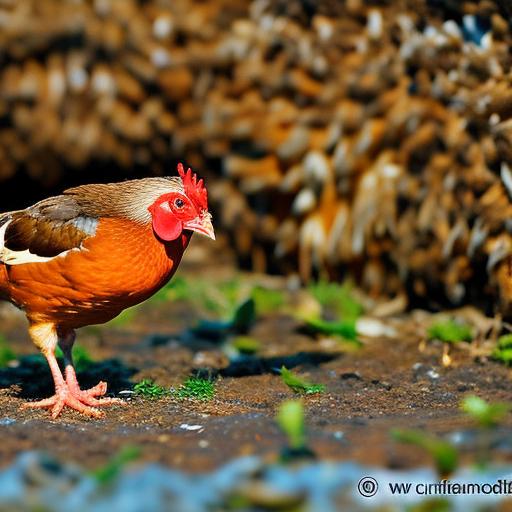Keeping chickens in New Jersey has become a popular trend in recent years. More and more people are realizing the benefits of having their own flock of chickens in their backyard. Not only do chickens provide fresh eggs, but they also offer a unique and educational experience for children and promote sustainable living practices. In this article, we will explore the laws and regulations surrounding backyard chickens in New Jersey, as well as provide tips on choosing the right breed, building a coop and run, feeding and caring for your chickens, managing their health and disease, and maximizing egg production. We will also discuss how to manage noise and odor, and highlight the many benefits of keeping backyard chickens.
Key Takeaways
- Keeping chickens in New Jersey is a popular and rewarding hobby for many residents.
- There are laws and regulations in place for backyard chicken ownership in New Jersey, including limits on the number of chickens allowed.
- Choosing the right breed of chicken for the New Jersey climate is important for their health and well-being.
- Building a coop and run for backyard chickens in New Jersey requires careful planning and consideration of local zoning laws.
- Feeding and caring for backyard chickens in New Jersey involves providing a balanced diet and regular health check-ups to prevent disease.
Laws and Regulations
Before embarking on your backyard chicken journey, it is important to familiarize yourself with the laws and regulations regarding keeping chickens in New Jersey. While many towns and cities allow residents to keep a small number of chickens, there may be specific requirements that need to be met. Some areas require a permit to keep chickens, while others have zoning restrictions that dictate where coops can be located on your property. It is also important to be aware of noise and odor regulations, as these can vary from town to town.
Choosing the Right Breed
When it comes to choosing the right breed of chicken for your backyard flock in New Jersey, there are several factors to consider. First and foremost, you will want to choose breeds that are well-suited to the climate in New Jersey. Some breeds are more cold-hardy than others and can withstand the harsh winters that the state often experiences. Additionally, you will need to decide whether you want egg-laying breeds or meat breeds. Egg-laying breeds are known for their ability to produce a large number of eggs, while meat breeds are bred specifically for their meat production. Finally, it is important to consider the temperament of different breeds. Some breeds are more docile and friendly, while others can be more skittish or aggressive.
Building a Coop and Run
Building a coop and run is an essential part of keeping backyard chickens in New Jersey. The coop provides shelter for your chickens, while the run allows them to have access to fresh air and exercise. When building your coop and run, it is important to choose the right materials that will withstand the New Jersey climate. Additionally, you will need to consider design considerations such as ventilation, insulation, and natural light. Predator-proofing your coop and run is also crucial, as there are many predators in New Jersey that would love to have a chicken dinner.
Feeding and Caring for Your Chickens
Feeding and caring for your chickens is an important aspect of keeping them healthy and happy. Chickens require a balanced diet that includes a combination of commercial feed, kitchen scraps, and foraging opportunities. It is important to provide them with the right amount of food to ensure they are getting the nutrients they need without overfeeding them. Additionally, chickens require access to clean water at all times. Cleaning the coop and run regularly is also important to prevent the buildup of waste and bacteria.
Health and Disease Management

Like any other animal, chickens are susceptible to various health issues and diseases. It is important to take preventative measures to keep your flock healthy, such as providing them with a clean living environment, regular vaccinations, and proper nutrition. It is also important to be able to recognize the signs of illness in your chickens so that you can take appropriate action. In some cases, it may be necessary to call a veterinarian for professional advice and treatment.
Egg Production and Collection
One of the main reasons people choose to keep backyard chickens is for their fresh eggs. Chickens typically start laying eggs around 5-6 months of age, depending on the breed. The frequency of egg production can vary depending on factors such as breed, age, and environmental conditions. It is important to collect eggs regularly to prevent them from becoming dirty or broken. Proper storage of eggs is also important to ensure their freshness and quality.
Managing Noise and Odor
Noise and odor can be a concern when keeping backyard chickens, especially in residential areas. There are several steps you can take to reduce noise from your chickens, such as providing them with enough space, keeping them entertained, and using noise-reducing materials in your coop. Odor can be managed by regularly cleaning the coop and run, using absorbent materials in the coop, and composting chicken manure.
Benefits of Keeping Backyard Chickens
There are numerous benefits to keeping backyard chickens in New Jersey. One of the main benefits is having a constant supply of fresh eggs. Not only are these eggs more nutritious than store-bought eggs, but they also have a superior taste. Chickens also provide natural fertilizer for your garden, reducing the need for chemical fertilizers. Additionally, keeping chickens can be an educational experience for children, teaching them about responsibility, animal care, and where their food comes from. Finally, keeping backyard chickens promotes sustainable living practices by reducing food waste and reliance on factory-farmed eggs.
Keeping backyard chickens in New Jersey has become a popular trend for good reason. The benefits of having your own flock of chickens far outweigh the challenges that come with it. However, it is important to familiarize yourself with the laws and regulations surrounding backyard chickens in your area before getting started. Additionally, choosing the right breed, building a suitable coop and run, feeding and caring for your chickens, managing their health and disease, maximizing egg production, and managing noise and odor are all important considerations when keeping backyard chickens. Ultimately, whether or not keeping backyard chickens is right for you will depend on your individual circumstances and preferences.
If you’re wondering about keeping chickens in New Jersey, you might find this article on chicken coop portage from Poultry Wizard quite helpful. It provides valuable insights on how to move your chicken coop around your yard to ensure your chickens have access to fresh grass and insects. Additionally, if you’re concerned about the size of your chicken coop door, Poultry Wizard has another informative article that discusses the ideal dimensions for a chicken coop door. For those who are also interested in keeping geese alongside chickens, Poultry Wizard offers an interesting article on whether geese can eat chicken feed. Check out these articles for more information and expert advice on raising poultry in New Jersey.
FAQs
Can you keep chickens in New Jersey?
Yes, you can keep chickens in New Jersey, but there are certain regulations and restrictions that you need to follow.
What are the regulations for keeping chickens in New Jersey?
The regulations for keeping chickens in New Jersey vary depending on the municipality. However, in general, you need to obtain a permit, keep the chickens in a secure coop, and maintain cleanliness and hygiene.
How many chickens can you keep in New Jersey?
The number of chickens you can keep in New Jersey depends on the municipality. Some municipalities have a limit on the number of chickens you can keep, while others do not.
Do you need a permit to keep chickens in New Jersey?
Yes, you need a permit to keep chickens in New Jersey. The permit requirements vary depending on the municipality.
What are the benefits of keeping chickens in New Jersey?
Keeping chickens in New Jersey can provide you with fresh eggs, natural pest control, and fertilizer for your garden. It can also be a fun and educational experience for children.
What are the risks of keeping chickens in New Jersey?
Keeping chickens in New Jersey can pose risks such as noise complaints from neighbors, attracting predators, and the spread of diseases. It is important to take necessary precautions to minimize these risks.
What should you consider before keeping chickens in New Jersey?
Before keeping chickens in New Jersey, you should consider the regulations in your municipality, the space and resources needed for the chickens, and the potential risks and benefits. It is also important to educate yourself on proper chicken care and maintenance.
Meet Walter, the feathered-friend fanatic of Florida! Nestled in the sunshine state, Walter struts through life with his feathered companions, clucking his way to happiness. With a coop that’s fancier than a five-star hotel, he’s the Don Juan of the chicken world. When he’s not teaching his hens to do the cha-cha, you’ll find him in a heated debate with his prized rooster, Sir Clucks-a-Lot. Walter’s poultry passion is no yolk; he’s the sunny-side-up guy you never knew you needed in your flock of friends!







